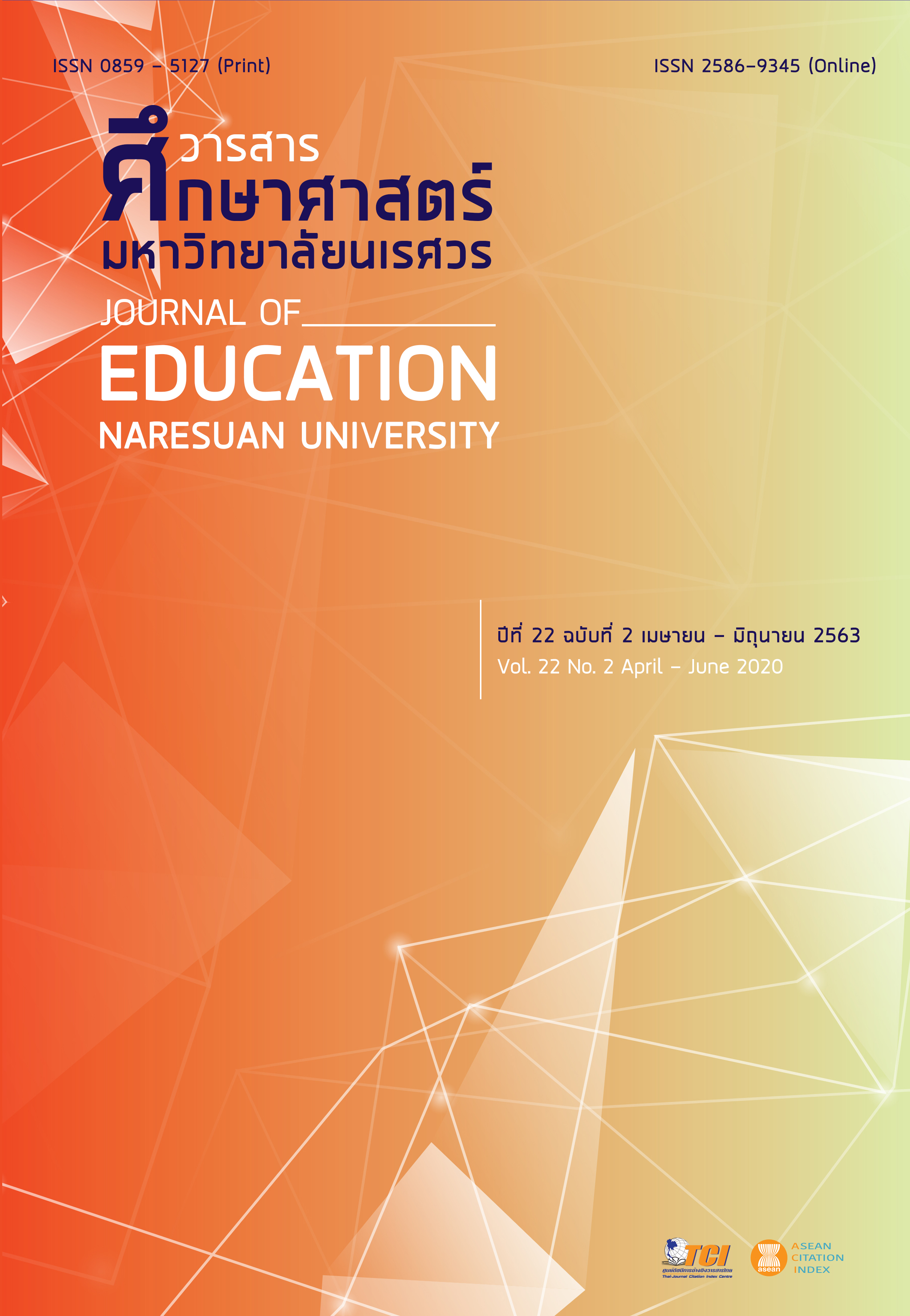THE DEVELOPMENT OF CURRICULUM PROMOTING QUALITY OF LIFE AGING: CASE STUDY OF MUNICIPAL CITY, PHITSANULOK
Main Article Content
Abstract
This research aimed to develop the curriculum promoting quality of life for the aging in the Municipal city, Phitsanulok. The research and development process was divided into 4 steps; Step 1: studying quality of life content for the aging, process of learning management and learning assessment to enhance the quality of life of aging. Step 2: constructing and verifying curriculum and document quality. Step 3: implementing the curriculum. Step 4: evaluating the curriculum. The sample group was 30 aging from Phra Ong Khao community health center. The research instruments consisted of quality of life form, activities of Daily Life test and waistline test. The data were analyzed by using means, standard deviations, t-test, chi-square and content analysis. The results at each step were presented as follows;
1. The content of quality of life for the aging consisted of 1) physical domain : exercise, food, sleeping, daily routine activities, drug use, prevent dementia, stretching, 2) psychological domain: self - understanding, others-understanding, no depression, regularly religious activities practice, dying preparation, 3) social relationships domain: no family isolation, do not be obsolete: up-to-date, social engaging, and 4) environmental domain: safe living place, good health and environment, annual health checkup, financial resources information, aging supporting organization Information. The learning process consisted of participating thinking, setting up a mutual agreement, activities, learning exchange, learning from the model and practice. Learning assessment was evaluated in 2 phases: 1) During the curriculum activities by verbal feedback, behavior observation and task performance. 2) After the curriculum activities by interviewing, group discussion, questionnaire and lesson learned.
2. The curriculum for promoting quality of life of aging in Municipal city, Phitsanulok consisted of concept of experience curriculum development. The instruction was applied by using 3 steps of the (A-Appraisal, I-Influence, C-Control): A-I-C technique. For the aging to have good quality of life. By the process 3 steps are as follows: 1) appreciation, 2) influence, and 3) control. The curriculum and document were appropriate at high level ( = 4.27 , S.D. = 0.54), (
= 4.38, S.D. = 0.58). The curriculum was then piloted for the further improvement. The result show a high level of appropriateness and ready for the implementation.
3. The implementation of the curriculum show that: 1) During the curriculum , the quality of life of aging was at the highest level, After the curriculum: overall quality of Life of aging in all four aspects were higher with statistical significant at the level of .05, the BMI and the waistline were higher with statistical significant at the level of .05.
4. The evaluation of curriculum was assessed in 3 aspects: input, process and output by the administrators and staffs who involved in elderly care and aging representatives’ opinions were acceptance, highly appropriate in all aspects.
Article Details
The owner of the article does not copy or violate any of its copyright. If any copyright infringement occurs or prosecution, in any case, the Editorial Board is not involved in all the rights to the owner of the article to be performed.
References
Boonphueak, P., Kaewurai, W., Wattanatorn, A., & Prachanban, P. (2014). Development of course curriculum on school study for create school identity based on process of mixed methods research: A case study of Chalermkwansatree School. Journal of Education Naresuan University, 16(1), 98-107. [in Thai]
Kessang, P. (2016). Action research. Bangkok: Chulalongkorn University Press. [in Thai]
Kompilianon, K., Thamrogsothisakul, V., & Wiboonrangsan, S. (2016). A development of curriculum to promoting health literacy in obesity for Matthayormsuksa 3 students. Journal of Education Naresuan University, 18(3), 250-264. [in Thai]
Phitsanulok Municipality. (2018). Phitsanulok Municipality Development Plan for four years (2018-2021). Phitsanulok: Phitsanulok Municipality. [in Thai]
Poisorn, K. (2015). Situation and quality of life of the elderly in spatial context industry: Case study in Samut Prakan, Uthai District, Phra Nakhon Si Ayutthaya Province. In the 53rd Kasetsart University Annual Conference. Bangkok: Kasetsart University. [in Thai]
Rodprapun, P., Thamrongsothisakul, V., & Wiboonrangsan, S. (2016). Development of youth media literacy curriculum based on participation learning for junior secondary school students. Journal of Education Naresuan University, 18(4), 156-170. [in Thai]
Siriwanrangsan, S., & Sangyeang, S. (2016). Model for improving the quality of life of rural elders. Journal of Preventive Medicine Association of Thailand, 6(2), 182-191. [in Thai]
Smith, W. E. (1991). The AIC Model: Concepts and practice. Washington, D.C.: ODII.
Southern Regional, Institute for Non-Formal Education. (2012). The curriculum of lifelong learning for the elderly lifelong learning program for the elderly. Retrieved July 20, 2018, from https://www.doc/elderlypeople2559.pdf [in Thai]
Sukanun, T., Jariyasin, S., Thummanon, T., & Jitpakdee, P. (2011). Quality of life of the elderly in Bansuan Municipality, Chonburi Province, Thailand. Thai Journal of Public Health, 41(3), 240-249. [in Thai]
Suwan, T., Prasanpun, S., Kaewurai, W., & Thamrongsothisakul, V. (2017). The development of curriculum to enhance the ability on Science project learning management for science teachers in the Lower secondary school. Journal of Education Naresuan University, 18(2), 25-36. [in Thai]
Suwanrata, W. (2016). Aging society: Stepped into high society with knowledge and wisdom. Bangkok: Parbpim. [in Thai]
Tumthong, B. (2011). Curriculum development (3nd ed.). Bangkok: Chulalongkorn University Press. [in Thai]
Uthaichay, T. (2016). Life quality of elderly’ s in the Lum Pan Chat Municipality, Wang Sam Mo District, Udon Thani (Master thesis). Maha Sarakham: Rajabhat MaHa Sarakham University. [in Thai]
Wudaree, N. (2018, April 22). interview. [in Thai]


